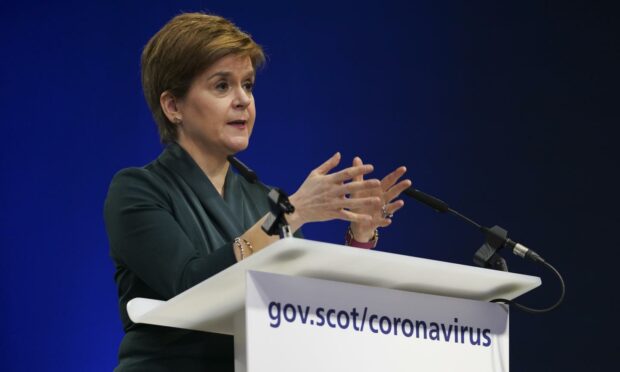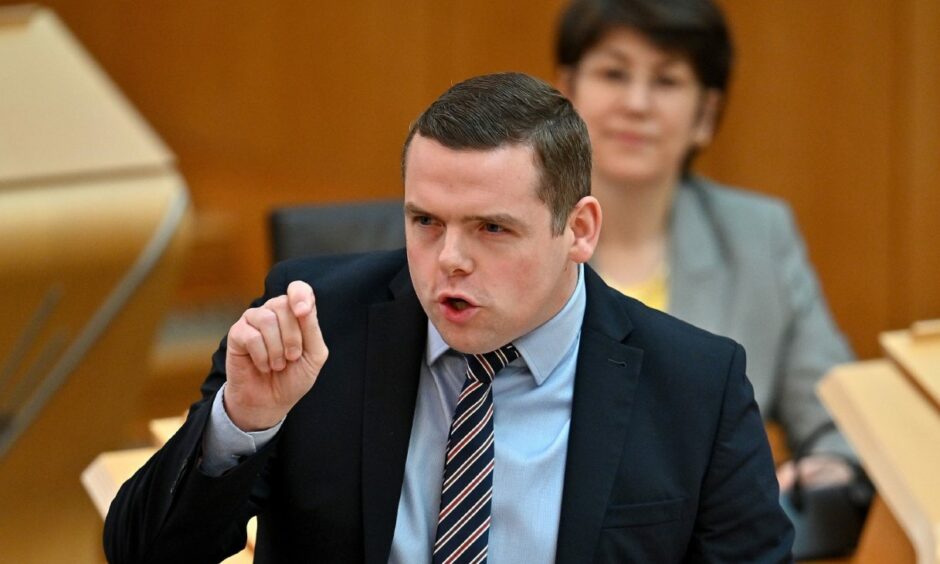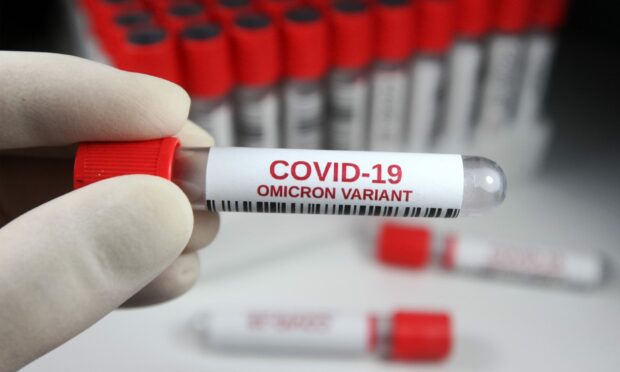Nicola Sturgeon has been urged to cut the self-isolation period for those who test positive for Covid-19 when she updates MSPs tomorrow.
The first minister is expected to confirm on Wednesday whether Scotland will follow England and Wales in reducing the length of time for self-isolation from 10 days to seven.
This would allow those who return a negative test on two consecutive days using lateral flow devices to end their self-isolation after a week.
The current length of isolation has been blamed for a rise in staff absences which put more pressure on business and public services over winter.
‘Dithering and delaying’
The first minister will deliver her next Covid-19 update at 2pm on Wednesday as parliament is recalled from recess for a special virtual sitting.
Speaking on BBC Good Morning Scotland earlier today, Deputy First Minister John Swinney confirmed the Scottish Government was “actively considering the issue of the self-isolation period”.
He said “further details will be shared with parliament in its virtual session tomorrow so, yes, that issue is under consideration”.
Mr Swinney added: “We are obviously looking at the clinical advice that is crucial in the handling of this because, as I’ve indicated before in these discussions, we do not in any way, shape or form serve anybody’s interest if we ignore the clinical dimension of this issue, and the risk of transmissibility of allowing individuals to return to the workplace if they’re still carrying the virus.”
It comes against a backdrop of surging coronavirus cases across the country, with more than 17,000 new cases reported on Tuesday.
A total of 56,290 tests were carried out, with 35.3% of these positive.
Scottish Tory leader Douglas Ross said the first minister’s “indecision, coupled with new restrictions, has harmed many businesses at what should have been their busiest time of year”.
He added: “Nicola Sturgeon must listen to these warnings from many crucial sectors and finally implement a cut in the length of time people have to isolate for.
“We’ve seen Wales and Northern Ireland now do this, so people have rightly been asking why has the first minister continued to wait to do likewise in Scotland?
“Her current approach is unsustainable and tomorrow’s update must finally bring in the necessary changes to protect essential services.”
Scotland v England
Mr Swinney pointed to official figures last week which showed one in 40 people were likely to have Covid in Scotland compared with one in 25 in England.
The data, which was published on New Year’s Eve, is for the week to December 23, before the additional post-Christmas restrictions were introduced in Scotland, including the cap to large gatherings.
But the first minister had urged people across Scotland to limit their socialising to three households before and after Christmas in a bid to tackle the Omicron variant.
Latest #COVID19 estimates show infection rates increased across all four countries of the UK in the week ending 23 Dec 2021 https://t.co/s9X6nd1ebr pic.twitter.com/tmLv5wSiuW
— Office for National Statistics (ONS) (@ONS) December 31, 2021
Scottish Labour’s health and Covid Recovery spokeswoman, Jackie Baillie, claimed Mr Swinny had been “misrepresenting” stats to “brag” about doing better than England.
She added: “The battle is to save lives and livelihoods, not play cheap constitutional politics.”
A Scottish Government spokesman said claims the data has been misrepresented by Mr Swinney were “totally unfounded”.
He added: “Prior to Boxing Day there were already substantial differences in Covid-19 protections between Scotland and England – most importantly on wearing face coverings.
“The ONS findings – published last week – show markedly less infection in Scotland than in England and the deputy first minister was making the entirely valid point that this is evidence that the different approach we are taking in Scotland is helping protect the population from the virus.”
‘Worst is absolutely behind us’
Meanwhile, one of the UK’s leading vaccine scientists is claiming the worst of the pandemic is “absolutely behind us”.
Oxford University professor and director of the Oxford Vaccine Group, Sir Andrew Pollard, who helped to develop the AstraZeneca jab in 2020, told The Telegraph the relatively light restrictions across England “seems to be working so far”.
He said: “The worst is absolutely behind us. We just need to get through this winter.”
Professor Neil Ferguson, from Imperial College London, whose data was instrumental to the UK going into lockdown in March 2020, said Covid-19 cases should start to drop across the UK in the next one to three weeks.
He told BBC Radio 4’s Today programme: “I think I’m cautiously optimistic that infection rates in London in that key 18 to 50 age group – which has been driving the Omicron epidemic – may possibly have plateaued.”


